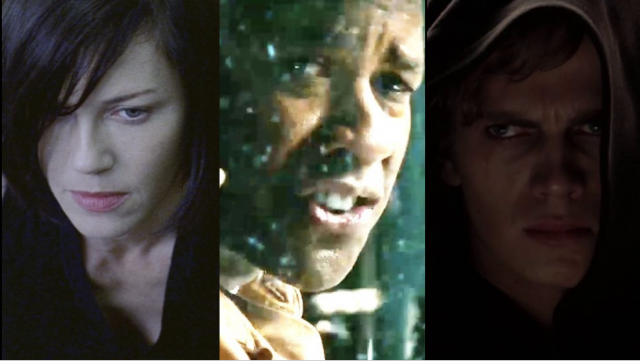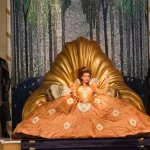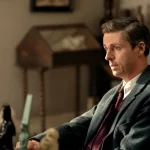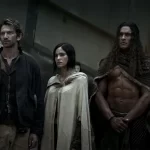Scott’s Movie Journal #6

It’s been so long since I did one of these, catching up with everything would be endless. Going to run down a few highlights from the past month, grouping where I can, starting with…
The Star Wars Prequels
I saw these as they came out from 1999-2005, and then never again. I was 13 in 1999, and you can proceed forward from there, but the general point is that I was young enough and dumb enough to completely love them just for being Star Wars movies, until Revenge of the Sith came out and I just straight-up thought it rocked. But I also saw it at midnight with a sizable portion of my senior high school class, so y’know, rose-colored glasses and all.
I was struck by a few things right away – first was that Phantom Menace is a complete disaster in its first half, a mess of characters who are never properly introduced and plotlines that are poorly-established. And having put it on a few days after revisiting Speed Racer, even the podracing scene lacked a lot of the panache it gets credit for. Like it wouldn’t hurt for Liam Neeson to have a reaction shot during it is all. The second half actually works better, despite getting bogged down in trade disputes and stuff, because at least it starts figuring out what the story even is, and the ending is terrific.
That sets it up well for Attack of the Clones, which for its first 2/3rds or so I thought might come away as the best of the bunch. The opening chase scene through Coruscant is definitely the best action stuff of the series, and the cross-cutting between Obi-Wan’s search for the bounty hunter and Anakin’s uneasy romance with Padme really works, despite some acting limitations in that latter thread. But especially once they hit Tatoinne and Anakin comes to realize that basically his whole life has been ruined by becoming a Jedi, it’s all really, really strong stuff. It gets at the best element of the prequels, where George Lucas tries to explore how decisions that seem good in the moment can have horrific consequences down the line, which (through sheer happenstance – the film was shot in 2000) was an incredibly relevant theme in the country by May 2002, when this was released. Even aside from that, it’s a really bold way to build out a mainstream fantasy series.
Unfortunately, the whole movie falls apart once Anakin and Padme go to rescue Obi-Wan, and it just becomes a series of awful early-CGI creatures that Lucas seems clueless as to how to direct his actors around. I don’t mind bad effects, but when the actors also don’t believe that something’s in front of them, that’s a major problem, and when you’re even animating stationary clone troopers, it all starts to feel a bit silly.
Fortunately, broadly speaking anyway, my memory was correct that Revenge of the Sith works very well indeed. It’s the only film in the whole 9-film run that puts a villain as its protagonist, and it embraces that darkness every bit as much as the original Star Wars embraced the light, and brings to the fore all the stuff I was talking about in terms of the horrific consequences lying just around the corner from just action. Overall, it’s certainly a less exciting series than I thought as a young teen, too often bogged down with actors struggling against CGI elements and sort of choppy storytelling, but the broad swaths of it are so resonant, and the imagery as the series goes on gets stronger and stronger.
Assorted Assayas
I had never seen Late August, Early September, so I put that on, which lead to some rewatches of Personal Shopper, Summer Hours, and demonlover. Late August falls into Assayas’ more directly biographical films like Cold Water, Apres mai, and Winter’s Child; this tends not to be my favorite register for him, and Late August did little to change that, though it has some of the more workaday details that makes Non-Fiction so strong, which I appreciated. The other three are straight-up my favorite things he’s done, to the point that I only prefer demonlover or Summer Hours – which almost couldn’t be more distinct – depending on which I’ve seen most recently (demonlover by about a week this time around). More than any other filmmaker working today, he captures the sense of living in a changing world, this sense of having very little that’s stationary and reliable, and how difficult it is to make the correct decisions for your own life when those foundations are constantly in question.
Assorted Tony Scott
Tony Scott’s one of those guys where, once you start in on a few of his movies, it gets really hard to stop. So revisiting Crimson Tide turned to revisiting True Romance and then Unstoppable and then seeing Revenge for the first time and then revisiting The Fan and Enemy of the State. There are seven or eight films he made that I think are just about as good as they come, Crimson Tide, Unstoppable, and The Fan among them, and revisits did little to alter that. Tide and Unstoppable are just ruthlessly good, bulletproof movies, brilliantly constructed and imaginatively executed, with premises that a film could easily coast on, but which he never takes for granted. Every second becomes how to make it harder, how to tilt the stakes, how to touch on just a little bit of subtext to squeeze all the more juice from it. Like Tide barely touches on race at all, and only does so obliquely at the climax, but everything that goes on between Hackman and Denzel is informed by it; class plays the same role in Unstoppable – the further up the ladder the decisions go, the more important they get, and the more disconnected the people making them are from the direct circumstances and their effects. They kick ass, through and through.
I saw Enemy of the State once, almost ten years ago, and found it sort of wanting, and yeah, it’s not up there with the Denzel stuff (Pelham excepted), but I dug it a lot more on revisit. It’s Dan Mindel’s first at-bat as director of photography, and he absolutely runs away with the license to experiment, pushing planned cinematographer Dariusz Wolski’s retina-searing overexposure even further, saturating the images in intense colors and blending the filmed footage with the surveillance in this beautiful, dreamlike way. The whole chase through the tunnel is as grand a tunnel chase as has ever been put to film. Beyond that, the rapport between Will Smith and Gene Hackman works very well, and while I still don’t care for the turn-the-tables-on-them third act, the denouement helps reinforce the pervasive threat of the security state, which on first view seemed too easily thwarted.
I’d long put off getting back around to True Romance, which meant the world to me when I was like 17-19, but in retrospect seemed like probably an ugly movie, and hey, guess what, it’s real ugly. Quentin Tarantino, who wrote this romantic screenplay before he ever even had a girlfriend, is understandably criticized for the racist language he uses in his films, but where elsewhere I can at least see the character angle he’s trying to get at, here it’s so embedded in the world, like it’s something everyone already agrees on, and isn’t as much an aberration. There’s still some really sweet stuff in there – I’d forgotten just how good Dennis Hopper and Christian Slater are together – and Patricia Arquette is absolutely going for it in an admirable way, but the whole thing just doesn’t hang together. After the 7 or 8 near-masterpieces that form the upper tier of Tony Scott, it’s where things start to fall apart for me.
Revenge is a little worse for wear, too – it’s a beautiful movie, and I think it gets at some of the aesthetic stuff he was trying to do in The Hunger much more effectively, but it has almost no real female voice, a problem for a film hinging on so many bad things happening to a woman, and all the men who try to control her fate. I also don’t much like Costner in it; he seems filled with misplaced confidence that the movie can’t quite harness effectively. But then out of nowhere James Gammon shows up and completely steals the show as a one-bad-night-away-from-death cowboy, only for Costner to take him on a series of bad nights. That’s good stuff. Decent ending too, as far as that sort of thing goes.
And then there’s The Fan. And look, I get why people dislike it. It’s as unpleasant as True Romance and Revenge. But the difference is, The Fan doesn’t lie to you about what it is. It doesn’t give you any of the sweetness to chase the bitterness away. It’s ugly people in an ugly world thinking, saying, and doing ugly things. The attempts at decency are always covers for self-interest, or small asides from doomed characters. It is a bleak, bleak portrait of what drives the American sport, and the dreams it promises but can never deliver. It’s also where Tony Scott starts to build his fast-cutting style into something beyond a reflection of the scenario’s tension, finding beauty in the dissonance and chaos, hitting the rhythm of a drummer, and it’s really lovely to see him come into himself.
This is also a good chance to plug an old episode of the show – ep 290, where David, Tyler, and I go through nearly all of Scott’s films (including his rarely-discussed British work) in the wake of his tragic death. I haven’t listened back to it, but I think I stand by most of what I said there? True Romance maybe excepted.
The Ghost Writer (Roman Polanski, 2010)
Nearly as good a film as anything Polanski’s made; I’d say only Chinatown definitely stands above it, but this can go toe-to-toe with Rosemary’s Baby or Repulsion or The Tenant or Tess any day as far as I’m concerned. It’s also one of the key films of the late- and post-Bush years, and as good a thriller as they come.
While I can dig a more ostentatiously surreal film as much as the next guy – Alain Resnais is one of my favorite filmmakers, and Marienbad is one of my ten favorite films – I generally go in more for films that on their surface seem perfectly realist, but in their telling take on surreal qualities. Starting with the very nature of Ewan McGregor’s character – who’s never given a name, discovers nothing new through the course of the story, and changes nothing by the end – and building outward, Polanski develops his familiar world in which everyone is being watched for the pre-smartphone surveillance era. Whatever’s watching you is smaller than any camera and bigger than any government, and it renders people into non-people, places into empty landscapes, and ordinary interactions into rehearsed, formulaic speech.
It’s unimaginable that Nicolas Cage was originally cast in this role, as the entire film depends on McGregor’s nothingness, his ubiquitous presence in 21st century cinema (pre-2020, he hadn’t gone a year with fewer than two credits since 2007) combined with how utterly forgettable he is in so much of it. Polanski is one of the rare directors to find something interesting in that, in a man you can almost see through, and to tease out the quiet desperation that comes with never being seen, but being sure you’re of some importance, despite the false humility the Ghost often assumes.
Olivia Williams really owns this movie though in way few actors have been able to seize control of a Polanski film, and almost always in supporting roles. His lead actors are often his subjects or victims, if you’ll excuse the expression. Williams has to play several angles in each scene – what the Ghost knows, what she knows, what the audience suspects; she quickly must become the reason the Ghost feels the need to stick around, while also building a suspicion that she’s the reason he must escape. The way she physically controls each scene is fascinating, her character’s every line a rehearsed dagger; no matter how vulnerable Ruth may appear, she’s appeared that way before for better men, and Williams has to bring a sense of familiarity to these proceedings. And she’s playing slightly older than herself, probably by a good 7-10 years, which is no small bit of humility for an actress.
Also a great film about the ignobility of modern luggage, the way that handle is a lifesaver but also throws off the center of gravity and never quite clicks like it should.
Tenet (Christopher Nolan, 2020)
This was the second time I watched it, and I used headphones so I could actually hear all the lines, and confound it, I still have almost no idea what’s going on moment to moment or what’s motivating anyone to do anything. I get that Elizabeth Debicki wants to leave her husband but can’t…that part’s a little foggier as to why she can’t…and I get that John David Washington is at least a little into her, which is why he keeps taking risks. What those risks precisely entail, how they deviate from the actual plan, or what that actual plan is…man I couldn’t say.
And yet I’m pretty into the movie. The action is cool and inventive, the performances really liven up the material, there’s some tremendously cool imagery, the score is wild, and when stuff goes backward while other stuff goes forward, you can’t ask for a better reason for the movies to be around. There’s also something that I’m still kind of digging out about it where the characters seem principally motivated by the demands of the script, which sort of maybe works nicely alongside the whole thing with time travel movies where people have to do what they do because they’ve already done it. There’s a complementary relationship at play there to some degree anyway.































My recollection (without looking anything up) is that in Tenet her character couldn’t leave because her husband had bought a fake she verified and he could hold her liable for that.
Just today Michael Brendan Dougherty published a article on the theological aspect of Tenet’s depiction of predestination vs free-will, which implicitly comments on whether the characters are “motivated by the script”.
That’s wild! Okay maybe we’re onto something here.